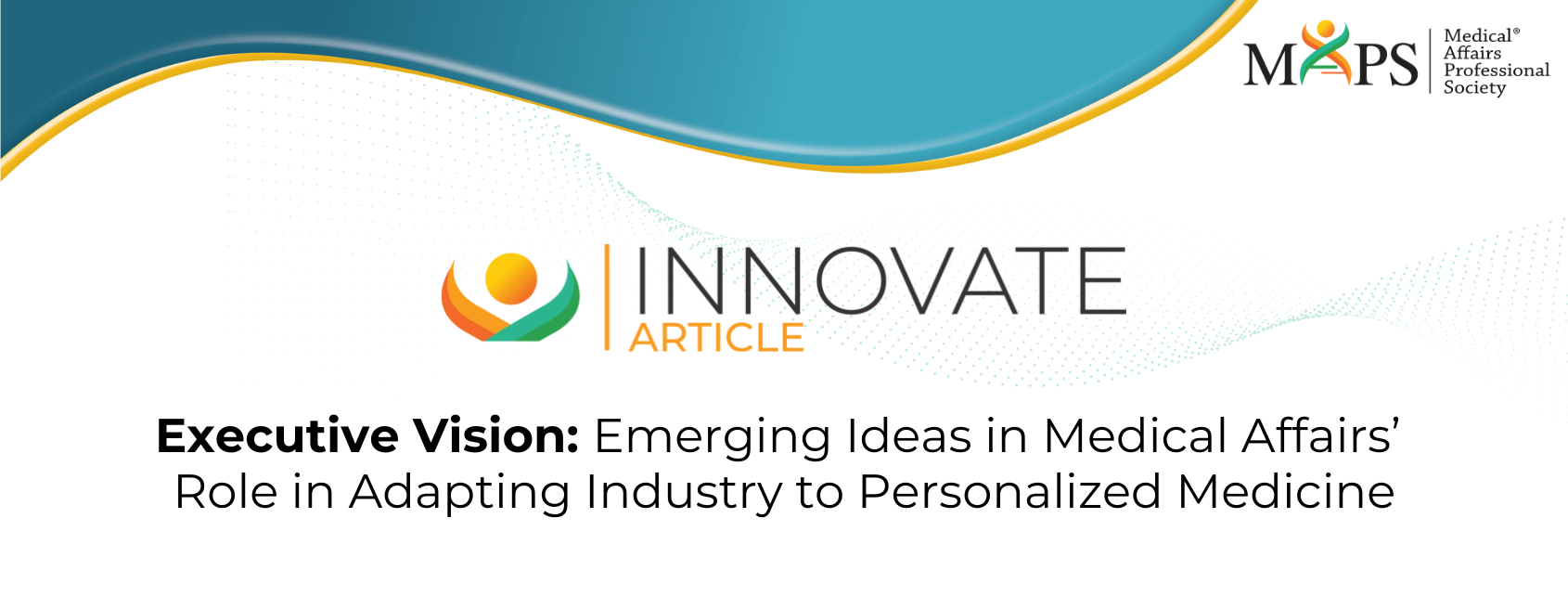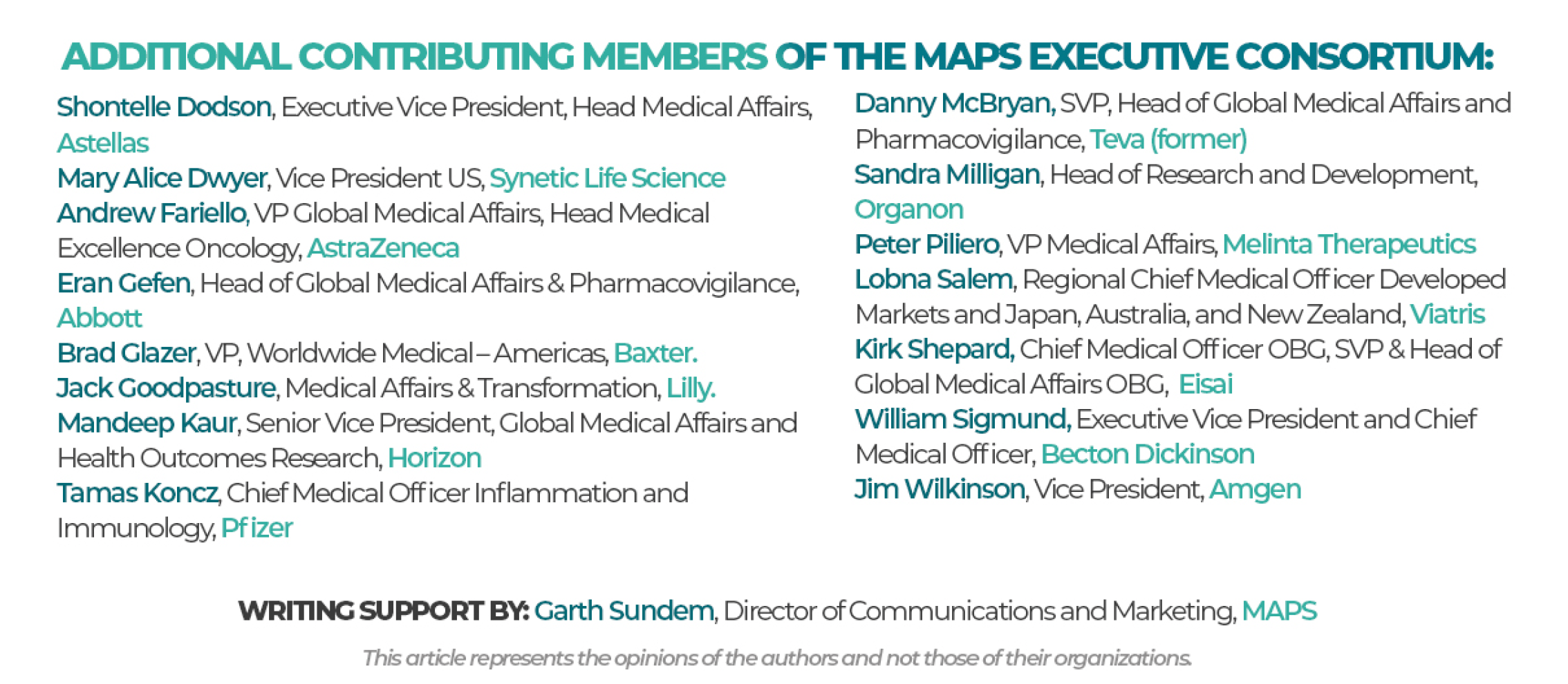Executive Vision: Emerging Ideas in Medical Affairs’ Role in Adapting Industry to Personalized Medicine
Introduction
The shift to personalized medicine is well underway, with many of the historic challenges such as the use of biomarkers to match patient sub-populations with targeted treatments already identified and being addressed. However, in addition to the more obvious hurdles to the implementation of personalized medicine are challenges that are only now starting to emerge – aspects of which are specifically relevant to the practice of Medical Affairs. Here we discuss ways in which Medical Affairs can help industry adapt its practices to deal with emerging issues in the transition to personalized medicine.
Personalizing the Use of Medicines with Broad Indications
While commonly understood to describe the use of targeted treatments, personalized medicine also includes segmenting the use of medicines with broad indications. In fact, in some ways the use of innovative treatment types such as gene therapies in the context of personalized medicine is more straightforward: The patients for whom a drug is appropriate is inherent in its indication, reducing many of the therapeutic conundrums. However, in diseases such as asthma and diabetes (and others), there may be many medicines available for use broadly across all diagnosed patients. Medical Affairs has the opportunity to play an essential role in “personalizing” the use of these medicines with broad indications – defining the individual/group characteristics that indicate which patients are most likely to receive maximum benefit from specific drugs. Much of this segmentation will be accomplished through the collection and analysis of real-world evidence and claims data.
Identifying Populations Unlikely to Benefit
To maximize the chance of a successful clinical trial, companies seek to identify and include patients most likely to demonstrate benefit using a validated endpoint, while not enrolling patients with higher likelihood of complications or in whom benefit may be harder to achieve. However, post-approval, physicians can use their clinical judgement to more broadly prescribe treatments, which can lead to patients being treated who were not represented in the clinical trial population. Beyond registrational trials and even within trial subpopulations, treatments may prove less effective in certain populations, increasing treatment burden and cost of treatment for the healthcare system. In the long run, industry credibility comes from doing the right thing for patients – and so another role for Medical Affairs in personalized medicine is to identify who is not being served by medicines used as currently indicated. For example, what are the characteristics of patients with high discontinuation rates? Or patients whose response is less than expected? While some companies will feel threatened by projects that have the potential to reduce rather than expand the number of patients under treatment, innovative organizations will see these cases as opportunities to develop new treatments. (See following topic.)
Feeding Back into Development
Personalized medicine can be seen as matching very specific patients with very targeted treatments. Of course, this model requires two major components: A sophisticated understanding of patient segments and also treatments to match these segments. Medical Affairs can help industry drill down below the level of all patients diagnosed with a disease or condition to pinpoint the characteristics that define subpopulations. Identifying groups of patients that are not optimally served by existing treatments points to opportunities to develop new therapies for these patients.
Informed Choice
Personalized medicine tends to present healthcare professionals and patients with complex choices. For instance, patients may weigh a broad-spectrum treatment against a more targeted approach or may have the option to use a treatment with high associated risk as well as benefit. With the shift toward shared decision-making, it is essential that patients are equipped with the understanding needed to make informed choices. Medical Affairs can address this challenge from two directions; first, continuing to generate evidence to distinguish between treatment options (esp. using RWE); and second, Medical Affairs can develop and deliver educational materials to help patients and their healthcare providers understand the available options as well as how the specifics characteristics of patients and their conditions enable different treatment approaches.
HCP Mindshift
In the past few decades, much of routine healthcare has been guided by treatment algorithms or protocols. While this remains the case, personalized medicine forces HCPs to go beyond only a “template-based” or one-size-fits-all approach to treatment and into a much more nuanced framework of care that weighs on- and off-label therapeutic options along with many patient-centric factors such as goals and access (some emerging options may not initially be reimbursed). For HCPs, this is a dramatic mind-shift. The time needed to have these important nuanced conversations may also not be practical for physicians in many health systems – implying that Medical Affairs may need to ensure that non-physician HCPs who are directly involved in patient care (e.g., nurse specialists) are also equipped to have these conversations. Educating non-physician HCPs may also require Medical Affairs teams to adjust the content and format of the materials used in scientific exchange. Of course, our understanding of optimal uses of (ever-evolving) therapeutic options is anything but static, and so there is ongoing need for Medical Affairs to help HCPs adapt their approach along with shifting recommendations.
Conclusion
In the past, diseases/conditions like cancer and diabetes and asthma were seen as monoliths and were treated with homogenous approaches. Today we are coming to understand the incredible diversity of both diseases and patients, presenting the opportunity to bring the promise of personalized care to rare and more common illnesses, optimizing care and potentially reducing medication risks. Medical Affairs is essential across the spectrum of activities needed to reach this goal – from generating the evidence needed to appropriately match patients with treatments, to communicating this evidence to patients and providers to inform treatment choice. As the therapeutic landscape becomes more complex, the scientific and clinical acumen of Medical Affairs will become increasingly important to ensure patients and society realize the potential of personalized approaches to medicine.
This article is part of our Executive Vision series, an initiative from the MAPS Executive Consortium. To learn more, please visit our Industry Partnership Program page.




